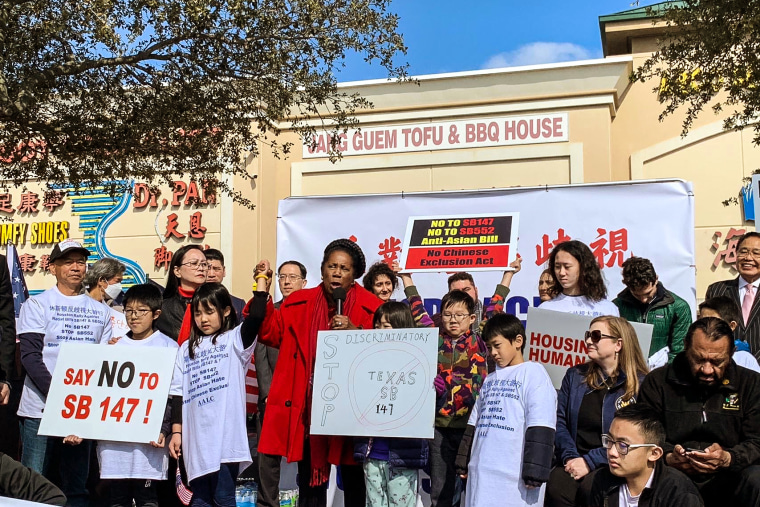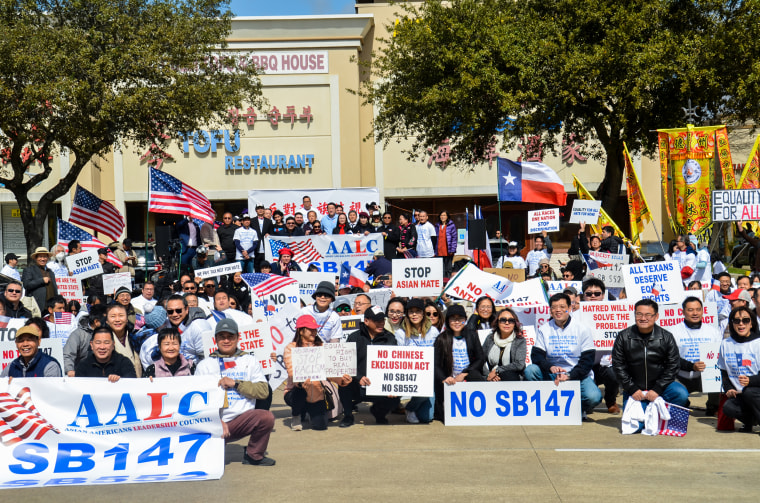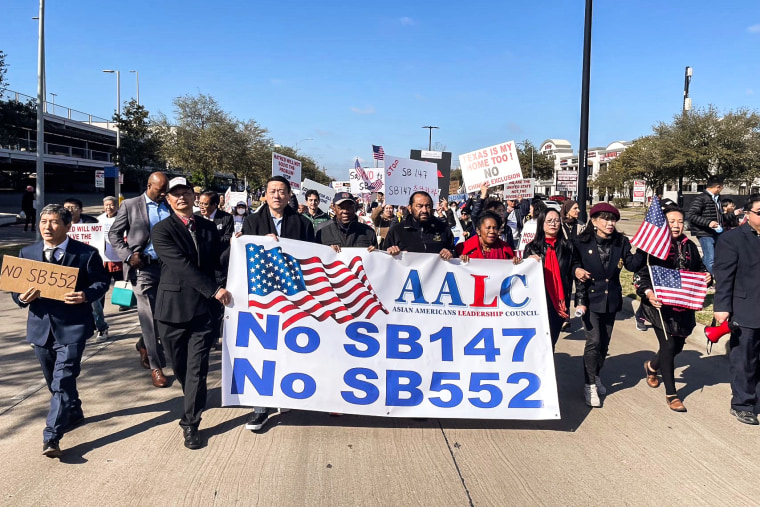Activist Ling Luo says her Chinese community in Texas has gone from fearful to infuriated — and they’re demanding that their voices be heard.
By the hundreds, they’ve been taking to the streets all over the state, pleading with elected officials to kill a piece of legislation they fear could threaten their futures.
A bill introduced in the Texas Senate in late December has been gaining steam over the past month, and it came as a bombshell to Asian Americans and others across the state. The legislation, SB 147, would make it illegal for Chinese citizens to buy any property in Texas, including homes.
Luo said it’s a shocking premise, incongruous with everything she thought America was when she moved here in 1997, but by the time she heard about the bill, it had already won the support of the biggest player in Texas politics. Gov. Greg Abbott, a Republican, tweeted last month, “I will sign it.
“This follows a law I signed banning those countries from threatening our infrastructure,” he continued.
The bill, introduced by state Sen. Lois Kolkhorst, a Republican, also covers citizens and entities of North Korea, Iran and Russia. It doesn’t delineate any exceptions for legal permanent residents, visa holders or dual citizens.
Kolkhorst did not reply to a request for comment. In a news release announcing the bill’s introduction, she said it is an attempt to safeguard Texans.

“The growing ownership of Texas land by some foreign entities is highly disturbing and raises red flags for many Texans,” Kolkhorst said in the release. “By comparison, as an American go try to buy land near a Chinese military base and see how it works out for you. It would never happen there and it shouldn’t happen here. Passing this law delivers some basic safeguards to ensure Texans remain in control of Texas land.”The Chinese population in Texas was estimated at 235,000 in 2021. Luo fears that if the bill passes in its current form, that number will decrease.
Asian residents say the legislation uses national security as a guise to further target and scapegoat their communities. They’re angry, they say, and they’re questioning whether they’re truly welcome in Texas.
As a Chinese immigrant who became a U.S. citizen years ago, Luo feels she’s one of the lucky ones. But she remembers the promise the U.S. once held for her and now says that that dream is being crushed in the immigrants around her.
“Their fear is: ‘I just got my green card. I can’t buy property anymore. How will I live here?’” she said. “Renting is not as great as the freedom of owning your own house. It’s everybody’s dream in the whole world.”
So she started an activist group, the Asian American Leadership Council, specifically to push back against the bill, and she put it on the popular Chinese social network WeChat.
Within days, she had a movement of hundreds behind her, including other leading voices in Texas.
Beyond spreading awareness of the bill, Luo and the Asian American Leadership Council have encouraged worried residents to write and call their legislators, even providing templates for those who don’t know where to begin. She hopes it doesn’t come to it, she said, but she’s even preparing people to testify before the Texas Legislature.
“There’s people who are asking if they need to get out of the state, like right now,” said Democratic state Rep. Gene Wu, who represents a heavily Chinese district. “I have never seen the Chinese community this active and this motivated in my entire adult life. The community is inflamed right now. They are enraged. “
Hundreds marched through Austin and Dallas in protest of SB 147 on Jan. 29. Since then, the movement has only grown across the state, and last week, Wu, Luo and around 1,000 other Texans held a rally in Houston. “Stop Asian Hate” and “Stop Chinese Exclusion,” some of the signs read.
Wu thinks back to his childhood, when his parents, who were both on visas, bought their first home together.
“My question is what does my childhood home, this dinky little house that my parents bought for $60,000, have to do with national security? I’ve not gotten an answer,” he said.

He drew comparisons to national legislation from the 1800s and the 1900s that were primarily designed to stop Asian farmers from buying land in several states, like the Alien Land Laws. Others have said it’s reminiscent of the Chinese Exclusion Act of 1882, which banned immigration of Chinese laborers to the U.S. altogether.
What scares Wu the most, he said, is that the bill is gaining support among Republicans in Texas.
“There’s this idea of perpetual alienness, this idea that Asian Americans can never truly be American, they can never truly be loyal, they can never truly be one of us,” he said. “And this is something that our community has struggled with since there was such a thing as ‘Asian American.’”
The Congressional Asian Pacific American Caucus, chaired by Rep. Judy Chu, D-Calif., denounced SB 147 in a release sent out Wednesday.
“While we do not oppose limitations on foreign state-owned enterprises, or on entities, companies, or individuals with ties to foreign governments, from making purchases of agricultural land or property, we staunchly object to any legislation — at the federal, state, or local level — that bans an individual from land or property ownership solely based on their country of origin,” the statement read.
Although the bill names four countries specifically, Luo said she worries that the fallout will be on all Asian communities and that others could fall victim to scapegoating.
“If we’re here legally, why do we have to get excluded?” she said. “You’re targeting people without citizenship, but how do you tell who is a citizen? Will we have to hold our passports every day in our handbag?”

The bill is unconstitutional and unlikely to pass, one expert says
Some bills introduced in the Texas Legislature are meant to be symbolic, said Mark Jones, a professor of political science at Rice University in Houston. He says SB 147 may be one of those.
In its present form, the bill has the potential to take a toll on the state’s economy, he said.
“They didn’t take into account that you have a nontrivial number of legal permanent residents and citizens who also have passports from these countries,” he said. “They also didn’t fully take into account the impact that it might have on residential housing or commercial properties.”
Jones said he’s almost certain the bill won’t pass in its present form. While the stripping of rights from foreign governments is one thing, he said, taking them from individuals is another.
“That article would be unconstitutional,” he said. “That would be effectively discriminating against a subset of a group based purely on their national origin.”
After the backlash began, Kolkhorst told local media that she planned to make a few changes to the bill.
“In the committee substitute, the bill will make crystal clear that the prohibitions do not apply to United States citizens and lawful permanent residents,” she said in a statement.
Kolkhorst didn’t mention visa holders, and no updates have been made to the bill so far. Chinese residents aren’t sure they ever will be.
“The community fully expects them to do this,” Wu said. “Because I think there’s an expectation that they’re going to do whatever terrible thing they’re going to do. … This is very, very popular on the Republican side.”
Luo said the introduction of the bill has already rocked Asian Americans’ faith in Texas. Chinese residents on both sides of the political aisle have been approaching her and Wu with shock that something like this could happen. She said she doesn’t see herself as fighting a political party — she just wants her community to be safe.
Ultimately, she said, while the bill claims to target China, it’s Texans who would be hurt.
“Legislators use these kinds of bills to just play with the Chinese community here and appeal to their voter base,” Luo said. “China won’t get hurt at all, and the Chinese investors won’t get hurt at all. It’s the people here, the non-U.S. citizens, Chinese immigrants, who are the ones getting hurt and totally destroyed.”

